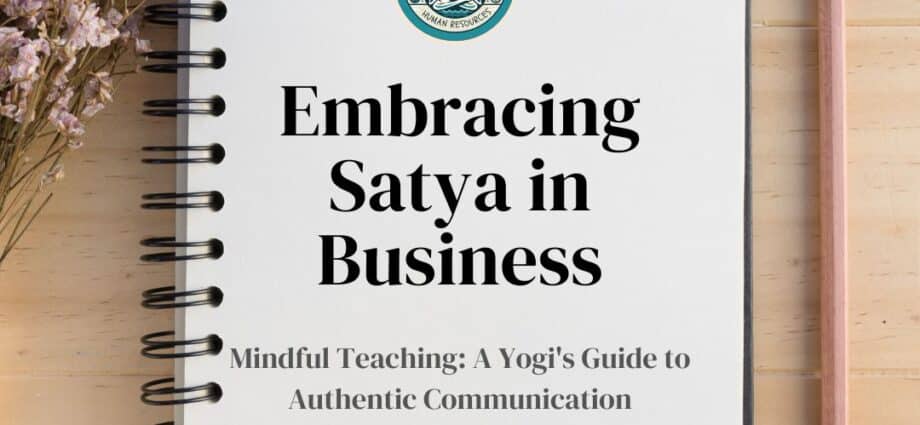Embracing Satya in Business and Mindful Teaching: A Yogi’s Guide to Authentic Communication. In the heart of every yoga practice lies the principle of Satya, or truthfulness, which guides us not only in our personal lives but also in how we conduct our business and teach. This principle of honesty and integrity is especially crucial in today’s digital age, where communication extends beyond face-to-face interactions. As yogis, applying Satya in our business practices, teaching methods, and digital communications is essential for building trust, credibility, and a genuine connection with our students and clients. This guide explores the importance of Satya in various aspects of a yoga business and offers practical tips for yogi HR professionals to enhance their skills in truthful communication and mindful teaching.
Incorporating Satya in Marketing
Marketing, often seen as a field rife with exaggeration and ambiguous promises, can benefit significantly from the principle of Satya. By clearly and honestly communicating the value and limitations of our services, we create a transparent and trustworthy relationship with potential and existing clients. This approach not only aligns with the ethical principles of yoga but also builds a strong, loyal community around our practice or business.
Tip: Review your marketing materials and ensure they accurately reflect the services and experiences you offer. Transparency in marketing cultivates trust and respect, leading to lasting client relationships.
Mindfulness in Yoga Teaching
Mindfulness is a cornerstone of effective yoga teaching, requiring us to be fully present and attentive to the needs and abilities of each student. This mindful approach, rooted in Satya, ensures that we honor the truth of each moment, adapting our teaching to serve our students best. By focusing on the present and observing each student’s experience without judgment, we foster an inclusive, supportive, and nurturing learning environment.
Tip: Begin each class with a few moments of silent observation, tuning into the energy and needs of your students. This practice will help you tailor your teaching to be more responsive and considerate.
Digital Communication Techniques
In our increasingly digital world, maintaining the principle of Satya in our online communications is vital. Tailoring our messages to be clear, accurate, and considerate ensures that our digital presence reflects our genuine self and respects our recipients’ perspectives. This careful attention to truthfulness helps prevent misunderstandings and maintains the integrity of our digital interactions.
Tip: Before sending out any digital communication, take a moment to review it from the recipient’s perspective. Ask yourself if the message is clear, accurate, and reflective of your authentic voice.
Enhancing Mindfulness Among Students
Encouraging mindfulness among students during practice is a key aspect of yoga teaching. Guiding students to focus on their breath and bodily sensations in the present moment helps them connect more deeply with themselves and their practice. This mindful focus not only enhances the benefits of yoga but also teaches valuable skills for managing stress and emotions off the mat.
Tip: Incorporate regular mindfulness cues throughout your class, reminding students to return their attention to their breath or the sensations in their body. This practice can deepen their yoga experience and foster a greater sense of inner peace.
Providing Constructive Feedback Online
Providing feedback, especially in a digital format, requires a delicate balance of honesty and tact. Offering constructive feedback privately, focusing on areas for improvement, exemplifies the practice of Satya. This approach ensures that our feedback is both truthful and supportive, aiding in the recipient’s growth and development.
Tip: When providing feedback online, be specific about what can be improved and offer practical suggestions. Framing feedback positively can help motivate and inspire, rather than discourage.
By integrating the principle of Satya into every aspect of our yoga business and teaching, we uphold the integrity and ethical foundation of our practice. Embracing truthfulness in marketing, teaching, and digital communications not only enhances our credibility and relationships but also deepens our own practice of mindfulness and self-awareness. Let us commit to practicing Satya in all our interactions, building a more authentic and connected yoga community.
This blog post serves as a comprehensive guide for yogi HR professionals and yoga business owners, emphasizing the importance of Satya in building a trustworthy, ethical, and successful practice. By adhering to these principles, we can create a positive impact on our students, clients, and the broader community, fostering an environment of honesty, respect, and mindful presence.
Test Your Knowledge:
Check Out Yogi Human Resources – Essential Foundations
Sample Compliance CalendarDear Readers,
Thank you for joining me on this journey of Embracing Satya in Business. I hope you found today’s insights valuable and inspiring.
If you’re eager for more on this topic, don’t forget to SUBSCRIBE and explore these resources:
- Nourish Your Being: Dive deeper into Yogic Diet: 30 Days to Holistic Health
- Mindfulness Meditations
- Stay Connected: Join our community to stay updated on future posts, exclusive content, and more.
May your journey be gentle, your spirit be bright, and your world be filled with boundless light, love, and levity.
Namaste.
Meg
@LightLoveLevity
P.S. Explore more insightful content on our blog at Light, Love, and Levity
Your engagement and feedback are invaluable, so please feel free to share your thoughts and questions in the comments below. Let’s continue to learn and grow together.


